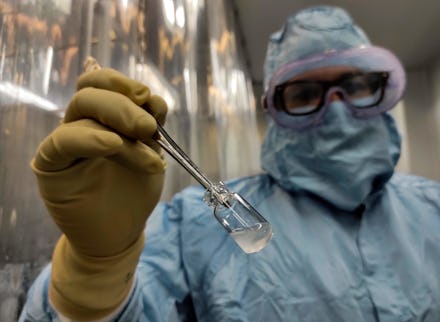Would you travel to Cuba for a coronavirus vaccine?

When people think about Cuban exports, they generally think of coffee and cigars. That may be about to change, though, because Cuba’s COVID-19 vaccine, called the Sovereign 2 — or Soberana — is entering its final phase of testing. Cuba is hoping to produce enough vaccine doses to inoculate its population and then some, so that they can share with countries in need of doses and, notably, tourists visiting Cuba, the New York Times reported. Here’s what we know so far about Cuba’s coronavirus vaccine plans.
Cuba’s Finlay Institute — which was created by Fidel Castro and is owned and operated by the Cuban government — is leading Latin America in vaccine development. Cuba is planning to produce 100 million doses of their vaccine 2021, BBC reported. The vaccine was produced with no assistance from the U.S., but scientists there have been in conversation with researchers from Italy and France. "We hope in the future it will be possible to move to the next step in co-operation," Vicente Vérez Bencomo, director of the Finlay Institute of Vaccines in Havana and one of the scientists leading vaccine development, told BBC. Indeed.
The Soberana vaccine is given in 3 doses spaced two weeks apart, according to the Times (and the latter doses can travel with you if you have to go back home, apparently). Unlike the Pfizer and Moderna vaccines, it doesn’t have to be stored below freezing, which, as we have seen all over the world is a major problem. The finicky storage requirements of those vaccines has created issues in distribution, spoilage, and waste. Hand it to communism to make a vaccine that may actually be usable for more than the most privileged among us.
The Sovereign 2 vaccine enters its third trial phase March 1st, which includes being tested on 150,000 volunteers in Cuba, Iran, and maybe Mexico, the Times reported. Vérez Bencomo also told the Times that once the island’s 11 million person population has been inoculated, the country could export the vaccine to countries in need and also offer vaccinations to foreigners who travel there.
Unlike some other countries, it appears that Cuba isn’t just trying to make a quick buck via vaccine nationalism. Cuban scientists say that the country has a long history of medical philanthropy. “Cuba always donated vaccines,” Gerardo Guillén, a scientist at the Center for Genetic Engineering and Biotechnology in Havana, told the Times. “We help other countries.”
Producing an effective vaccine with enough doses to share could help boost the Cuban economy — which has been hard hit by the pandemic — and could also change the global perspective on Cuban biomedical innovations, many of which have been stymied by embargoes. Technically, U.S. citizens cannot travel to Cuba without a visa granted by the U.S. Embassy, but it’s not that hard to get one. All visitors must quarantine upon arrival for one week, as of February 1st, though, and the vaccine isn’t ready to roll out yet, so don’t book your flight just yet.
As we compete, globally, to fight this pandemic, quality is always a question. “Sometimes people think because it’s Cuba, they’re just making these drugs in their garage and giving them to people, and that’s not true,” Candace Johnson, president of Roswell Park Comprehensive Cancer Center in New York, to the Times.
Cuba, in fact, has been leading the world in innovative vaccine design for some time. Their scientists created a pioneering meningitis vaccine in the 90’s and Johnson is currently conducting a trial of a Cuban-made lung cancer vaccine at the Roswell Center.
Cuba has arguably one of the best healthcare systems in the world and also one of the highest life expectancies. Unlike basically the rest of the planet, Cuba successfully contained the spread of coronavirus. It did so by screening residents every single day and treating infected people immediately, something that is only possible within an organized and effective state-run medical system that centers the common good by prioritizing prevention. What a concept.